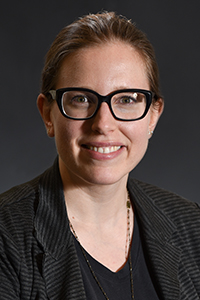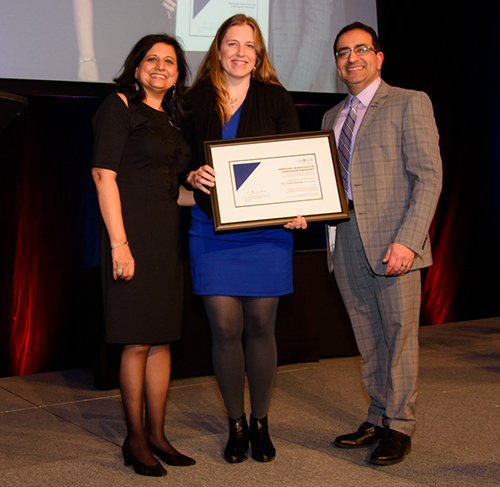Fall 2020 (Volume 30, Number 3)
The CRA’s 2020
Emerging Investigator:
Dr. Claire Barber
Download PDF

Your work to date focuses on measuring the quality of care provided to patients living with inflammatory arthritis, so that if there are gaps in processes of care or suboptimal outcomes, these can be readily identified and remedied. Can you tell us more about your research and how your findings are translated into the clinical context?
My interest in the area of quality of care really began while working with the Arthritis Alliance of Canada (AAC) on developing System-Level Performance Measures for Inflammatory Arthritis. The AAC Models of Care executive at the time was led by Dr. Vandana Ahluwalia, Dr. Dianne Mosher, Dr. Michel Zummer and Ms. Anne Lyddiatt. They developed the Pan-Canadian Approach to Inflammatory Models of Care and an associated toolkit to help promote high quality of care and improved outcomes for patients living with inflammatory arthritis. We then worked to develop the performance measures to test whether patients were getting timely access to care and treatment across five Canadian provinces. The results of this work have improved our understanding of how to examine quality of care in Canada using different data sources and have also demonstrated some areas where improvements could be made.1-4 Building upon this work, we have recently collaborated with patients, healthcare providers and healthcare leaders nationally to define key strategic objectives and associated performance measures for a more comprehensive framework for monitoring rheumatoid arthritis (RA) care including patient outcomes. Locally, we have begun to test these measures and we have developed continuous reporting mechanisms to help monitor care on an ongoing basis through the University of Calgary Department of Medicine’s Health Analytic Work Group (HAWG). We have collaborated with the Alberta Medical Association’s Physician Learning Program (PLP) to develop individualized physician reports on the measures and have presented them to physicians for group feedback and are currently working on a number of projects to try and optimize care.
You have also collaborated internationally, working with the American College of Rheumatology (ACR) on measure development efforts and have recently led the American College of Rheumatology’s update on Functional Status Assessment Measures. How would you describe your experience working with international organizations?
Early in my career, my PhD supervisor, Dr. John Esdaile, introduced me to Dr. Jinoos Yazdany who was the chair of the American College of Rheumatology’s Quality Measure Subcommittee, and she invited me to join the committee. This was a critical moment for my career as I gained invaluable experience while serving on the committee under Dr. Yazdany, and later Dr. Lisa Suter and Dr. Alex Limanni. I learned about highstakes quality measurement and contributed to a number of projects to further the science in this area including in outcome measurement and electronic e-specification of measures. I was eventually tasked with helping to lead the recent ACR update on Functional Status Assessment Measures with mentorship by Dr. Kaleb Michaud.5 Meeting and working directly with these extraordinary individuals has been an enjoyable and highly rewarding experience.
Are there other areas of interest you would like to investigate in the future? What projects will you be undertaking this year?
My main focus for my research is really to work on closing gaps in quality of care that we have identified and to better understand how the gaps in care impact patient and health system outcomes. Some of my ongoing projects include the following:
Dr. Glen Hazlewood (co-PI) and I have a CIORA-funded grant to implement a decision aid for early RA to help improve shared decision-making between physicians and patients.
Co-PIs, Drs. Jessica Widdifield, Diane Lacaille and I are leading a team of researchers in three provinces through a CIHR-funded grant to better understand the impact of
adherence to the AAC System-Level Performance Measures on patient and health system outcomes.
My research team has also developed a patient quality of care survey for RA which we will be testing shortly as an alternative to chart reviews for monitoring care.
I am a co-chair with Dr. Widdifield for the Canadian Rheumatology Association’s HR committee, and along with Dr. Stephanie Kulhawy-Wibe and members of the committee we will soon be launching the CRA’s Workforce survey for 2020, which will examine the impact of the pandemic on the rheumatology workforce.
Through my STARS Career Development Award (funded by the Canadian Institutes of Health Research – Institute of Musculoskeletal Health and Arthritis) I will be examining how to improve the delivery of care to patients through a better understanding of patient needs and complexity.
What are some of the highlights and challenges you have experienced thus far in your career? How have you overcome these challenges?
Having a career as a clinician-researcher is such a privilege and I am grateful for this opportunity every day. I have the time to take the knowledge and experiences from my clinical practice and think about how to improve patient care. I am a big believer in the concept of a Learning Healthcare System where we are constantly learning from every encounter and listening to every patient to improve care delivery and patient outcomes.
Every project, grant, and paper brings unique challenges and rewards. I try to approach each challenge by breaking it down into manageable pieces. There are frequent “failures” in health research including rejected grants and papers etc. Being persistent is the key to success!
My research mentors and colleagues have been instrumental in guiding my career and supporting my research. Drs. John Hanly, Paul Fortin, Dianne Mosher, Deborah Marshall, Diane Lacaille, Cheryl Barnabe, Glen Hazlewood, John Esdaile and Jessica Widdifield and many others have inspired and supported me along this journey.
What has been your proudest accomplishment to date in your research?
Winning the CRA Emerging Investigator Award has probably been the most memorable accomplishment to date, especially as it occurred in close proximity to being awarded a STARS Career Development Award and a CIHR grant, none of which would have been possible without my mentors and colleagues listed above. I also take immense pride in the successes of my students’ accomplishments. They really help make an academic career worthwhile and fun!
What was your first thought when you learned that you would receive this award?
I was very moved. What was especially moving was that my research mentor Dr. Fortin was also receiving the CRA Distinguished Investigator Award. Dr. Fortin was my research supervisor when I was a rheumatology resident at the University of Toronto (U of T). Without his encouragement and support, I would not have pursued or applied for advanced training in epidemiology, which subsequently launched my career. It was also exciting that my good friend and colleague Dr. Mahendira won the CRA Emerging Teacher-Educator Award as we were residents at the U of T in the same year.
For those wanting to pursue rheumatology and research, what advice would you give?
Surround yourself with amazing mentors (there are so many to choose from in Canadian rheumatology!) and work early to build networks. I am also happy to meet and talk to any prospective trainees!
If you weren’t pursuing research as a career, what would you be doing?
My husband suggests that I would probably be a vegan chef. In all seriousness, probably a clinical rheumatologist. I really enjoy patient care.
What talent do you have that is not utilized successfully in your workplace?
When I was younger I spent a lot of time studying music and I played the cello, piano and sang in choirs. We should probably have more musical events at work as it helps people work as a team and have fun. During the pandemic I joined the Calgary Physicians Choir and we practiced via Zoom! It really helps reduce stress during an otherwise difficult time.
If you could eat one food for the rest of your life, what would it be?
I haven’t met a vegetable I didn’t like!
What is your favourite book of all time?
I have lots of favourite books, and it is a bit hard to rank them… one in the last year that was particularly memorable was by Dan Harris: “10% Happier – How I tamed the voice in my head, reduced stress without losing my edge, and found self-help that actually works – a true story.” It is an easy and accessible introduction to meditation best suited to more cynical audiences. Little did I know how helpful it would be to have some additional tools to help with coping with stress during the pandemic. He also has a podcast with amazing guests and a meditation app (I promise I get no commission!)

Dr. Barber receiving her award from then CRA President Dr. Vandana Ahluwalia and Dr. Raheem Kherani.
Claire Barber, MD, PhD, FRCPC
Assistant Professor, Rheumatologist,
University of Calgary, Calgary, Alberta
References:
1. Barber CEH, Marshall DA, Szefer E, Barnabe C, Shiff NJ, Bykerk V, et al. A population-based approach to reporting system-level performance measures for rheumatoid arthritis care. Arthritis Care Res (Hoboken). 2020; doi: 10.1002/acr.24178. [Epub ahead of print].
2. Barber CEH, Lix LM, Lacaille D, Marshall DA, Kroeker K, Benseler S, et al. Testing population-based performance measures identifies gaps in juvenile idiopathic arthritis (JIA) care. BMC Health Serv Res. 2019; 19(1):572.
3. Barber CEH, Thorne JC, Ahluwalia V, Burt J, Lacaille D, Marshall DA, et al. Feasibility of Measurement and Adherence to System Performance Measures for Rheumatoid Arthritis in 5 Models of Care. J Rheumatol. 2018; 45(11):1501-8.
4. Barber CEH, Schieir O, Lacaille D, Marshall DA, Barnabe C, Hazlewood G, et al. High Adherence to System-Level Performance Measures for Rheumatoid Arthritis in a National Early Arthritis Cohort Over Eight Years. Arthritis Care Res (Hoboken). 2018; 70(6):842-50.
5. Barber CEH, Zell J, Yazdany J, Davis AM, Cappelli L, Ehrlich-Jones L, et al. 2019 American College of Rheumatology Recommended Patient-Reported Functional Status Assessment Measures in Rheumatoid Arthritis. Arthritis Care Res (Hoboken). 2019; 71(12):1531-9.
|
